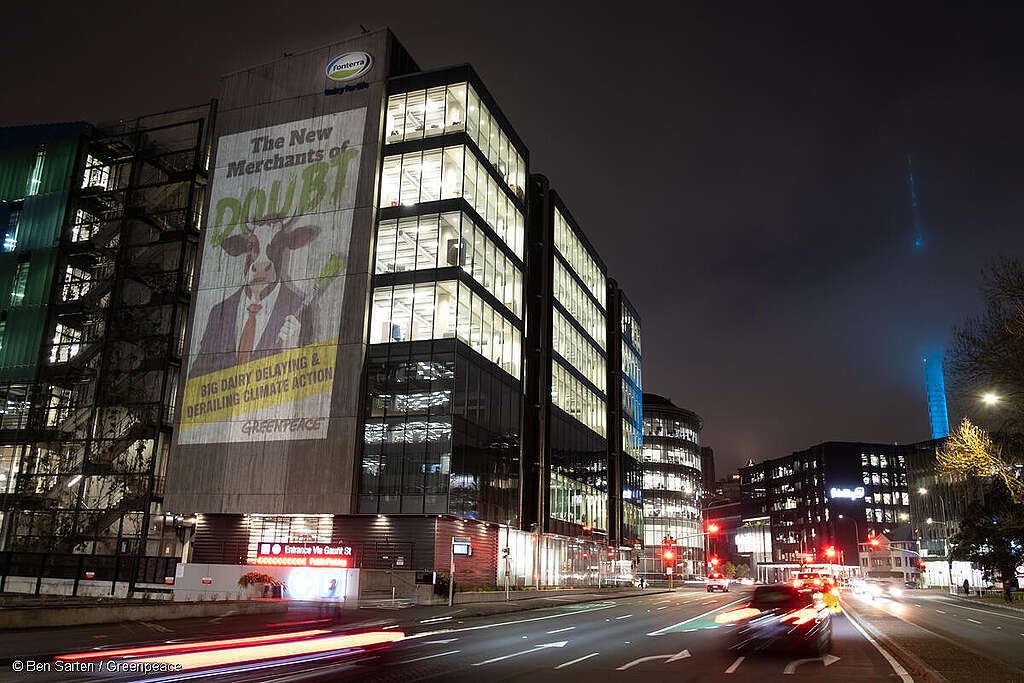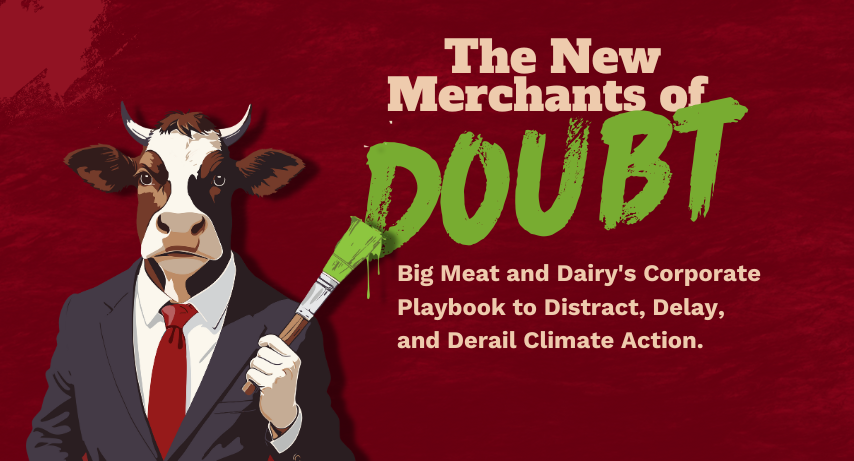Greenpeace Aotearoa is raising the alarm about Fonterra’s role in derailing international climate action. A new investigation has uncovered that globally, large agribusiness corporations are deploying the same playbook used by Big Tobacco and Big Oil to thwart regulations meant to protect the public interest.

The new report, entitled The New Merchants of Doubt, was released by Changing Markets Foundation today. It analyses the actions of 22 of the biggest meat and dairy companies across four different continents, and it specifically highlights Fonterra and the New Zealand livestock industry as key players in an industry-wide strategy to delay regulation of emissions from animal agriculture.

Nusa Urbancic, CEO of the Changing Markets Foundation stated: “This report exposes the blatant hypocrisy of Big Meat and Dairy, which claim to be committed to climate solutions while employing deceptive tactics to distract, delay and derail meaningful action. These tactics mirror those of Big Oil and Big Tobacco, allowing them to continue their harmful practices unchecked.”
Greenpeace Aotearoa spokesperson Amanda Larsson says, “Big Dairy is New Zealand’s worst climate polluter, and now the New Merchants of Doubt report exposes Fonterra’s leading role in work to undermine climate action and avoid accountability for their climate pollution both here and overseas.”
Agricultural emissions, primarily from intensive dairy, made up more than half of New Zealand’s greenhouse gas emissions in 2022. Animal agriculture is the single largest source of human-made methane emissions, which are 80 times more potent than carbon dioxide.
The New Merchants of Doubt report exposes how, rather than acting to meaningfully reduce livestock emissions, Big Meat and Dairy use a smokescreen of weak voluntary targets, green marketing and promises of future technological fixes that rarely materialise, while mobilising significant lobbying resources behind the scenes to delay and derail progressive legislation.
“The report highlights years of predatory denial and delay by New Zealand’s intensive dairy industry, spearheaded by Fonterra,” says Larsson.
“Not only are they lobbying the Government here in New Zealand to delay climate action, they’ve also spent millions of dollars in the last decade on lobbyists and political donations in the European Union and the United States.”
Fonterra also faces accusations of greenwashing, as the report reveals they spend more than five times their yearly research and development budget on marketing and PR, which often portrays New Zealand dairy as natural and environmentally-friendly.
“It has now been more than 20 years since the first attempt to put a price on and reduce New Zealand’s outsized agricultural emissions,” says Larsson. “The Luxon-led Government has delayed this yet again, by scrapping He Waka Eke Noa, removing requirements for agriculture to enter the Emissions Trading Scheme, and failing to address dairying – the biggest source of climate pollution – in the draft Emissions Reductions Plan.”
“We all pay the price for the dairy industry’s failure to take responsibility for their pollution. The climate crisis is here and now. In New Zealand, communities are still recovering from extreme weather events, from Cyclone Gabrielle to the recent Wairoa floods.
“As the New Zealand Government once again backtracks on its responsibility to hold a polluting industry accountable for the damage it is causing, the report makes it clear that overseas customers are wising up to agri-industry greenwash and expect real action. Fonterra and the Luxon Government are doing farmers here in Aotearoa a disservice by trying to deny and delay the inevitable.”
